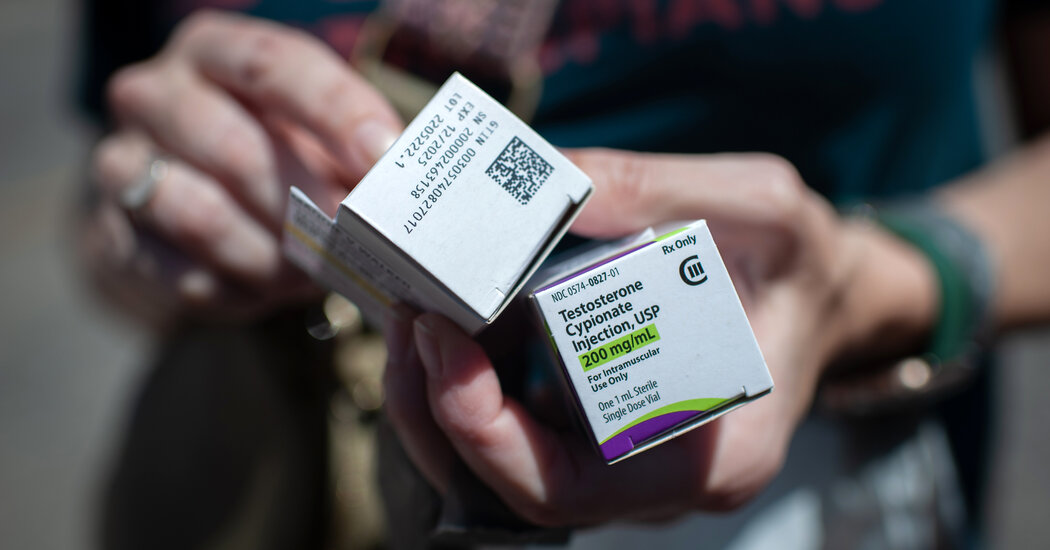
The American Academy of Pediatrics backed gender-related treatments for children on Thursday, reaffirming its position from 2018 on a medical approach that has since been banned in 19 states.
But the influential group of doctors also took an extra step of commissioning a systematic review of medical research on the treatments, following similar efforts in Europe that found uncertain evidence for their effectiveness in adolescents.
Critics across the political spectrum — including a small but vocal group of pediatricians — have been calling for a closer look at the evidence in recent years, particularly as the number of adolescents who identify as transgender has rapidly increased.
The treatments are relatively new, and few studies have tracked their long-term effects. Health bodies in England and Sweden have limited access to the treatments after carrying out systematic reviews, the gold standard for evaluating medical research.
“The board has confidence that the existing evidence is such that the current policy is appropriate,” said Mark Del Monte, the chief executive of the A.A.P. “At the same time, the board recognized that additional detail would be helpful here.”
As for the policy changes in Europe, he said, “they engaged in their process, we’re engaging in our process.”
After completing the review, he said, the group will issue additional clinical guidance for doctors and likely update its recommendations.
All 16 board members of the A.A.P., which represents 67,000 pediatricians across the United States, voted to reaffirm the 2018 guidelines at a meeting on Thursday in Itasca, Ill. The vote comes at a time of intense political pressures on transgender people and the doctors who care for them.
Over the past two years, Republican lawmakers across the country have banned what’s known as gender-affirming care, which can include psychotherapy, puberty-blocking drugs, hormones and, rarely, surgeries. Opponents of the care argue that it is experimental and children lack the maturity to consent to it.
The A.A.P. has roundly condemned the legislative bans as a dangerous intrusion into complex medical decisions between doctors and families, and has filed amicus briefs to support the many legal challenges brought against the bans by civil rights groups.
Much of the academy’s support for gender-affirming care rests on its 2018 previous position statement, which said the treatments were essential and should be covered by health insurers. Transgender adolescents have high rates of anxiety, depression and suicide attempts, and early evidence suggested that gender-affirming care could improve their mental health.
Position statements like those voted on today remain valid for five years before they are up for review, at which point they may be reaffirmed, retired or revised in light of new evidence. One example of such a reversal is the academy’s 2017 endorsement of infant peanut consumption, based on a landmark study showing that early exposure could help prevent lethal allergies.
Some scientists criticized the decision to continue to recommend the treatments for young people before completing a rigorous review.
The move is “very clearly putting the cart before the horse,” said Dr. Gordon Guyatt, a clinical epidemiologist at McMaster University who helped develop the field of evidence-based medicine.
Based on previous systematic reviews, Dr. Guyatt said, the A.A.P.’s report will most likely find low-quality evidence for pediatric gender care. “The policies of the Europeans are much more aligned with the evidence than are the Americans’,” he said.
In June, England’s National Health Service announced that it would restrict the use of puberty blockers to clinical trials because “there is not enough evidence to support their safety or clinical effectiveness as a routinely available treatment.” Last year, Sweden’s national health care oversight body similarly determined that, on the basis of its systematic review, “the risks of puberty-inhibiting and gender-affirming hormone treatment for those under 18 currently outweigh the possible benefits.”
In the United States, a small group of pediatricians has pushed for a similar review from the A.A.P., one of the few institutions with enough centralized power to influence health care practices. Dr. Julia Mason, a pediatrician in Gresham, Ore., co-founded a group called the Society for Evidence-Based Gender Medicine that has been highly critical of gender treatments for minors. Since 2020, she said, she has unsuccessfully lobbied the academy’s leadership to commission a systematic review.
Dr. Mason said she was pleased the group finally decided to take a close look at the data. “We are making strong recommendations based on weak evidence,” she said.
But Dr. Marci Bowers, a gynecologic and reconstructive surgeon and the president of the World Professional Association for Transgender Health, was heartened by the A.A.P.’s endorsement of the care, which she said profoundly improves many children’s lives.
“They know this population,” said Dr. Bowers, who is a transgender woman. “They know the stories. Anecdotally, it’s overwhelmingly positive.”
She also pointed out that doctors in many specialties, and particularly in pediatrics, routinely use medicines that haven’t yet been tested in large and rigorous clinical trials. And Europe, unlike many U.S. states, has not banned the care entirely.
“What they’re saying is this population needs to be studied,” she said, referring to European policies. “And I agree with that.”




